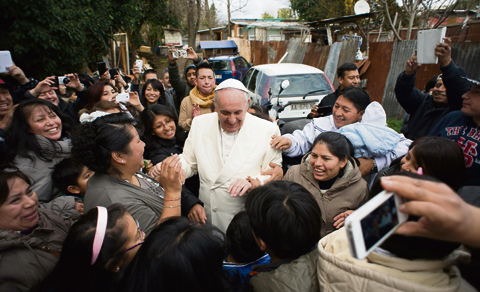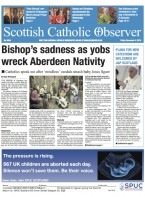April 24 | ![]() 0 COMMENTS
0 COMMENTS ![]() print
print

When did I see a stranger?
IAN DUNN explores the April theme of the Knights of St Columba prayer campaign: Immigration, refugees and ignoring the less fortunate, issues being widely discussed ahead of general election
The Knights of St Columba prayer campaign calls the Faithful to prayer and, with an election looming, the message for this month says: “Politicians will be discussing the subject of immigration. They will be trying to divide communities and stop less fortunate people entering our countries. Because we can’t see them, does it mean we can ignore them?”
Pope Francis has made concern for immigrants one of the hallmarks of his Pontificate. Something that was underlined earlier this year when he visited an immigrant settlement on the outskirts of Rome (above). The settlement on the northeastern edge of Rome was once a Gypsy or Roma camp, but now is mainly inhabited by Latin American immigrants, who have found no other place to live. The residents kissed the Pope’s hand and clicked photos of him with their mobile phones. As they pressed against him, he said: “Let’s pray to our Father in heaven. How many of you speak Spanish?” “All of us,” they responded, so with the Pope they recited the Lord’s Prayer in Spanish.
It is just a recent example of how Pope Francis has attempted to put those on the edges of society at the centre of his mission. In his message to mark this years’ world day for migrants and refuges he reminds us that the Lord says: “I was hungry and you gave me food, I was thirsty and you gave me drink, I was a stranger and you welcomed me, I was naked and you clothed me, I was sick and you visited me, I was in prison and you came to me.”
“The Church opens her arms to welcome all people, without distinction or limits, in order to proclaim that ‘God is love.’ From the beginning, the Church has been a mother with a heart open to the whole world, and has been without borders,” the Pope added. “This mission has continued for two thousand years.”
Solidarity
The Pope said he wanted a ‘Church without frontiers, Mother to all, that spreads throughout the world a culture of acceptance and solidarity, in which no one is seen as useless, out of place or disposable.’
“Today this takes on a particular significance. In fact, in an age of such vast movements of migration, large numbers of people are leaving their homelands, with a suitcase full of fears and desires, to undertake a hopeful and dangerous trip in search of more humane living conditions,” he said.
“Often, however, such migration gives rise to suspicion and hostility, even in ecclesial communities, prior to any knowledge of the migrants’ lives or their stories of persecution and destitution. In such cases, suspicion and prejudice conflict with the biblical commandment of welcoming with respect and solidarity the stranger in need.”
The Holy Father said that despite that hostility all of us ‘sense in our conscience the call to touch human misery, and to put into practice the commandment of love that Jesus left us when he identified himself with the stranger, with the one who suffers, with all the innocent victims of violence and exploitation.’
“The courage born of faith, hope and love enables us to reduce the distances that separate us from human misery,” he goes on. “Jesus Christ is always waiting to be recognised in migrants and refugees, in displaced persons and in exiles, and through them he calls us to share our resources, and occasionally to give up something of our acquired riches. Pope Paul VI spoke of this when he said that ‘the more fortunate should renounce some of their rights so as to place their goods more generously at the service of others.’
Practical help
The Pope does say that mere kindness to needy refugees is not enough.
“Solidarity with migrants and refugees must be accompanied by the courage and creativity necessary to develop, on a world-wide level, a more just and equitable financial and economic order, as well as an increasing commitment to peace, the indispensable condition for all authentic progress,” he concluded. “Dear migrants and refugees! You have a special place in the heart of the Church, and you help her to enlarge her heart and to manifest her motherhood towards the entire human family. Do not lose your faith and hope!”
In this month of prayer let us consider if we live up to the standards Pope Francis sets. Do we make our home welcoming to those who come in fear and suffering? Do we help those make the world a place filled with love rather than hate?
– The Knights of St Columba spiritual bouquet is a gift of prayer. The Catholic lay organisation started a journey of prayers, devotional acts or good deeds on December 28, 2014, the Feast of the Holy Family, and invites you to take part on this spiritual path over the next 10 months. Help to build a garland of between now and the Feast of St John Paul II, on October 22 this year. Submit your prayers and devotions in one of the following ways. Writing to: The Knights of St Columba, Head Office, 75 Hillington, Road South, Glasgow, G52 2AE or e-mail to [email protected] You can also contribute through the national website at www.ksc.org.uk
– The SCO is media partner for the Knights of St Columba spiritual bouquet










